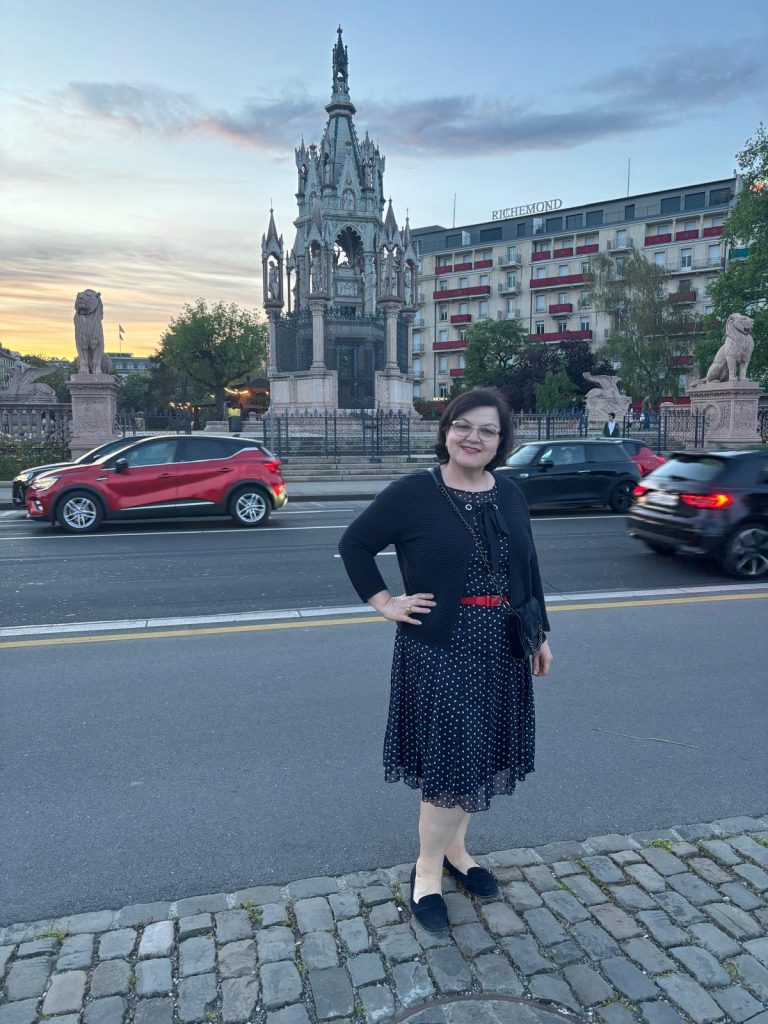
Literature and Liberty: Blerina Zoto’s Path to Advocacy
Blerina Zoto has built a remarkable career that exemplifies her deep commitment to human rights, education, and humanitarian work. Born in Albania, she witnessed her country emerge from a totalitarian regime in 1992, a pivotal period that sparked her passion for advocacy. In the same year, she completed her studies in literature at the University of Tirana, marking the beginning of her journey towards empowering others. Blerina’s dedication to human rights has driven her to work tirelessly in various capacities, influencing positive change and inspiring many. Her efforts in education have opened doors for countless individuals, providing opportunities for growth and development. As a humanitarian, she has championed numerous causes, always striving to make a tangible impact. Blerina’s unique perspective, shaped by her experiences during Albania’s transformation, fuels her relentless pursuit of justice and equality. Her story is a testament to the power of resilience and the importance of standing up for what is right.
How did your experiences growing up in post-totalitarian Albania influence your commitment to human rights and education?
Growing up in post-totalitarian Albania had a profound impact on my commitment to human rights and education. Having lived in a country emerging from a period of repression and lack of fundamental freedoms, I witnessed the devastating consequences of human rights deprivation and limited access to quality education.
The stories from my parents and grandparents about the years of dictatorship, where freedom of expression was severely repressed and access to education was restricted for those who did not conform to the regime’s ideals, deeply marked me. I understood the crucial importance of protecting fundamental rights to ensure a just and equitable society.
In school, I saw how biased, state-controlled education could influence minds and limit individuals’ potential. This motivated me to advocate for free and accessible education for all as a means of emancipation and personal development.
These experiences drove me to actively engage in the promotion and defense of human rights and education. I firmly believe that everyone deserves to live in a society where their rights are respected and where they have the opportunity to receive an education that allows them to fully realize their potential.
What motivated you to pursue a degree in “French literature and civilization “, and how has this background influenced your career?

What motivated me to pursue a degree in French literature and civilization was, above all, a deep passion for words and stories. Since childhood, I have always been fascinated by the power of literature to transport, move, and provoke thought. The richness of the French language and the depth of its literary tradition particularly captivated my interest.
Studying French literature and civilization offered me a more nuanced understanding of the culture, history, and ideas that have shaped not only France but also the world. This education refined my analytical skills, taught me to approach texts with a critical mind, and enriched me with a global perspective on social and cultural issues.
Professionally, this path has had a significant impact. It has allowed me to develop valuable communication and analytical skills in various contexts, whether in teaching, writing, or other creative fields. The in-depth knowledge of French culture and literature has also been a major asset in roles that require cultural sensitivity and historical understanding. In sum, this academic journey has not only fueled my passion but also provided a solid foundation for a rewarding and versatile career.
Can you share some challenges you faced while balancing your education and career with your responsibilities as a single mother after your divorce in 2004?
After my divorce in 2004, juggling my studies, career, and responsibilities as a single mother was a considerable challenge. The emotional and physical burden was intense, and it was often difficult to find a balance between these different aspects of my life.
One of the main challenges was time management. With classes to attend, assignments to complete, and a part-time job to support us, I had little time left to care for my children. Nights were often short, as I used the late hours to study once my children were asleep.
Financially, the situation was also precarious. Thanks to the support of my family, I had to face tuition fees, living expenses, and costs related to my children’s education and well-being. This required me to be creative and disciplined in managing my budget, finding solutions to minimize costs while ensuring a good quality of life for my children.
Additionally, the emotional stress was omnipresent. The guilt of not being able to spend as much time with my children as I wanted, combined with academic and professional pressure, was sometimes overwhelming. However, these challenges also made me stronger. They taught me resilience, organization, and the importance of asking for help when needed.
I was also fortunate to have the support not only of my family but also of my friends, who often took care of my children during my class or work hours. Their support was invaluable and helped to lighten some of the load.
In retrospect, although this period was extremely difficult, it was also formative. It allowed me to develop skills in time management, problem-solving, and emotional endurance, all of which have been valuable in my career and personal life since.
What key lessons did you learn from your decade-long tenure within the Albanian government, especially in supporting vulnerable minorities?
During my ten years of service in the Albanian government, I learned several key lessons, especially regarding support for vulnerable minorities.
Firstly, I learned the importance of inclusion and representation. For public policies to be effective and fair, it is crucial that the voices of minorities are heard and considered in the decision-making process. I have seen firsthand how the active participation of vulnerable communities can lead to more tailored and sustainable solutions.
Secondly, I understood that protecting minority rights requires a multidimensional approach. It is not enough to pass laws; rigorous implementation and monitoring mechanisms must also be put in place. This includes training civil servants, raising public awareness, and collaborating with non-governmental organizations to ensure that the rights of minorities are respected and promoted.
Thirdly, I realized the importance of education and awareness in combating prejudice and discrimination. Awareness campaigns and educational programs can transform attitudes and promote a culture of tolerance and respect. Investing in educating young people about the values of diversity and inclusion is essential to building a more just and equitable society.
Finally, I learned that supporting vulnerable minorities requires courage and determination. There are often political and social resistances to overcome, but remaining steadfast in one’s convictions and continuing to advocate for equality and justice is indispensable.
These lessons have not only enriched my understanding of the challenges faced by vulnerable minorities but also strengthened my commitment to working towards a more inclusive and equitable society.
What were some of the significant achievements and challenges during your time representing Albania at the United Nations Human Rights Council?
During my tenure representing Albania at the United Nations Human Rights Council, several significant achievements and challenges marked my mandate:
Significant Achievements
-Promotion of Women’s Rights: The Albanian diplomatic mission played a key role in formulating and promoting resolutions on women’s rights and gender equality. This included implementing policies aimed at strengthening women’s rights in various contexts, with a particular focus on combating domestic violence and discrimination.
– Strengthening International Collaboration: We facilitated collaboration among member states to address common human rights issues. This cooperation helped expand global initiatives and improve the international response to human rights crises.
– Support for Local Initiatives: As a representative, I supported several local initiatives in Albania aimed at promoting human rights.
-Enhancing Monitoring Mechanisms: We contributed to improving the monitoring mechanisms for Human Rights Council resolutions. This allowed for better assessment and more rigorous follow-up on member states’ commitments to human rights.
Challenges Encountered
-Political Resistance: One of the main challenges was overcoming the political resistance of some member states. Differences in opinion on sensitive issues sometimes hindered the implementation of resolutions and the achievement of consensus.
-Limited Resources: The limited personnel resources in our diplomatic mission sometimes restricted our ability to undertake more ambitious initiatives.
-Complexity of Humanitarian Crises: Addressing complex humanitarian crises while respecting diverse cultural and political contexts required a delicate balance. Conflicts of interest and crisis situations often complicated the search for effective solutions.
-Implementation Challenges: Implementing the recommendations and resolutions of the Human Rights Council sometimes encountered obstacles at the national level due to differences in legal systems and the political priorities of member states.
Overall, my tenure representing Albania as a human rights expert diplomat at the United Nations Human Rights Council was marked by notable advances in the promotion of human rights, while also facing complex challenges that required diplomatic strategies and sustained efforts to overcome obstacles.
How did your work with I Volunteers in Switzerland contribute to your understanding and engagement with international efforts?
ICVolunteers, based in Geneva, Switzerland, works with volunteers to implement social and educational programs to assist local populations and communities in their development. Through volunteering, ICVolunteers collaborates with organizations in the humanitarian, social, environmental, and medical fields to carry out projects and conferences at local, national, and international levels. Additionally, ICVolunteers plays an important role in promoting volunteerism: encouraging civic engagement, connecting organizations, individuals, and communities, and supporting their efforts in this domain.
My work with ICVolunteers in Switzerland has significantly enriched my understanding and engagement in international efforts in several ways:
Contribution to Understanding
-Global Perspectives: Collaborating with ICVolunteers provided me with the opportunity to work on diverse international projects, which allowed me to better understand global challenges and different approaches to addressing them. I learned how local issues can be interconnected with broader international problems.
-Humanitarian Methods: This experience exposed me to best practices and methodologies used in the humanitarian field. I gained a deeper understanding of the processes involved in planning, executing, and evaluating projects with international impact.
-Culture of Collaboration: ICVolunteers fosters a collaborative approach with various international actors. This made me aware of the importance of cooperation between organizations and countries to achieve common goals and solve global issues.
Strengthening Engagement
-Practical Skills: Working with ICVolunteers allowed me to develop practical skills in project management, coordinating international teams, and resource mobilization. These skills are essential for effective participation in international efforts.
-Personal Commitment: Participating in international humanitarian projects deeply motivated me to engage more in global initiatives. I saw the direct impact of our work on communities, which strengthened my belief that concerted actions can lead to significant positive changes.
-International Network: This experience expanded my network of contacts in the humanitarian and international fields. By working with various partners and volunteers, I was able to establish professional relationships that foster ongoing collaboration and the exchange of expertise for future projects.
In summary, my work with ICVolunteers not only deepened my understanding of international issues but also strengthened my commitment to actively and informatively participate in international cooperation efforts.
As an ambassador and Executive Council member of FEDE, what initiatives have you been most passionate about, and how have they impacted education and human rights?
The FEDE is a network of 500 private higher education and vocational training institutions sharing a common project of rigor, quality, and ambition: putting the student at the heart of its educational mission.
By offering degree and professional training programs valued by European stakeholders, FEDE schools contribute to a grand project: creating a vast higher education space in Europe and globally.
Staying close to new educational practices, supported by a structured network of member schools and alumni, adhering to European standards, and recognized by professionals and recruiters, FEDE schools prepare students for the jobs of today and tomorrow.
As an ambassador and Executive Council member of FEDE, several initiatives have particularly inspired me and had a significant impact on education and human rights. Among these initiatives, I would like to highlight:
-Promotion of Inclusive Education;Strengthening Human Rights Awareness Programs; Support for Education for Refugees and Migrants
-Human Rights Excellence Award Competition: As a member of the jury for FEDE’s annual human rights competition, I had the opportunity to participate in evaluating innovative projects proposed by students and young people from around the world. This competition, accessible via (the FEDE website: https://www.fede.education/), showcases creative and inspiring initiatives for the promotion and defense of human rights. It plays a crucial role in encouraging creativity and engagement among young people in the field of human rights.
The impact on education and human rights within this structure is realized through:
– Improving Educational Accessibility;
– Strengthening Awareness;
– Integrating Refugees and Migrants;
– Encouraging Innovation
The human rights competition has not only highlighted inspiring projects but also stimulated innovation among young people. By valuing their ideas and contributions, we have strengthened youth engagement in human rights issues and promoted creative solutions to global challenges.
In sum, these initiatives have enriched my personal commitment while contributing to positive changes in the fields of education and human rights. They have created more inclusive educational environments, promoted increased human rights awareness, and encouraged innovative and inspiring solutions on a global scale.
Can you describe some of the most impactful projects and commitments you have led at the Liaison Center for Women’s Associations in Geneva (CLAFG)?
As part of sustainable development and with the goal of realizing human rights for all, the CLAFG aims to promote gender equality by empowering women to make decisions and control their lives, both personally and professionally. This involves providing women with opportunities for training and professional development, ensuring equal participation of women in political decision-making processes, and recognizing the contributions of women in all areas of society.
Creating a real societal impact is our challenge! We achieve this through three main objectives:
– Economic Empowerment of Women
– Political Empowerment
– Enhancement of Women’s Image
Main Activities and Achievements in 2023:
– Research and Development” Project: Financially supporting women to achieve their academic or professional life projects.
– Health: Psychology and Well-being” Project: CLAFG offers various services to help women regain their balance. Services include psychological support, Psy-F, immediate and occasional support through hypnotherapy, mental health, dermo-aesthetics, and physical and skin health.
– Political Support for Women: Three conferences/debates with female candidates during the three levels of elections in 2023.
-Enhancement of Women’s Image and Promotion of Female Leadership in Classical Music: Organizing a concert with the United Nations Orchestra on October 11 at Victoria Hall. Five soloists and a conductor will perform works by five remarkable female composers.
Perspectives:
– Implementing a Dynamic Leadership Training Program (FEDE): This program will enable women to acquire the knowledge and skills needed to inspire others and lead them towards achieving common goals. The program includes two themes:
– Theoretical: Focused on the concept of leadership.
– Practical: Focused on personal development to enhance one’s leadership.
What advices would you give to young women aspiring to make a difference in the fields of human rights, education, and humanitarian work?
My advice to young women is to stay determined, continually educate themselves, build strong networks, and always keep in mind the importance of empathy and compassion. With these principles, they will be well-equipped to make positive and lasting changes in the fields of human rights, education, and humanitarian work.
– Educate and Train Yourself: Continuously seek knowledge and develop your skills to stay informed and competent.
– Engage Locally: Start by making a difference in your own community. Local engagement can be a powerful foundation for broader impact.
– Develop Your Network: Build and maintain connections with people who share your goals and values. Networking can open doors to opportunities and collaborations.
– Be Persistent: Challenges and setbacks are part of the journey. Persistence and resilience are key to overcoming obstacles and achieving your goals.
– Cultivate Compassion and Empathy: Understanding and caring for others will enhance your effectiveness in any field. Empathy helps in building trust and meaningful relationships.
– Utilize Your Unique Talents: Identify your talents and passions and use them to contribute in a unique way. Whether through writing, art, communication, or other skills, there are many ways to make a difference.
– Stay Informed and Adaptable: Keep up with current trends and be willing to adapt your strategies as needed. Flexibility is crucial in responding to evolving challenges.
– Seek Sustainable Impact: Focus on creating long-term, meaningful change rather than short-term solutions. Sustainable efforts lead to more lasting results.
– Collaborate and Share: Collaboration is essential. Work with other organizations, groups, and individuals to maximize the impact of your efforts. Sharing resources, knowledge, and experiences enriches collective work and leads to more effective solutions.

APPLY TODAY
100 Top Global Women Entrepreneurs – Global Woman Magazine
Our Journey in 12 Months:
Our Journey in 12 Months – Global Woman Magazine
5 Things That Show Money is Not Evil:
5 Things to Show That Money Is Not Evil – Global Woman Magazine
Global Man Magazine Page:
Global Woman, Global Man: Socials:
Global Woman Magazine (@global_woman.magazine) • Instagram photos and videos






